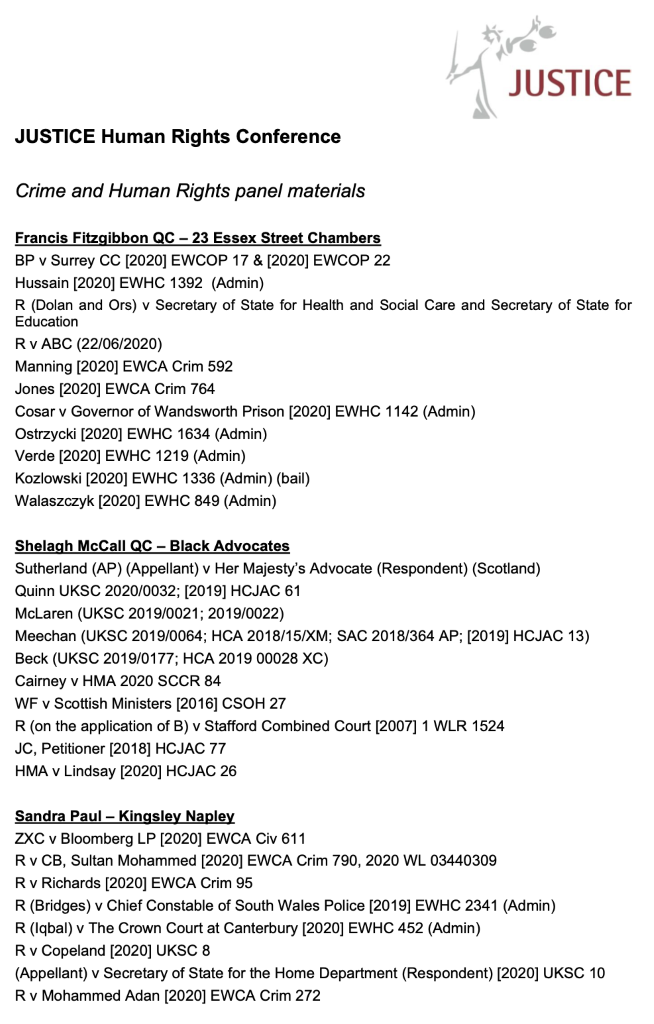Reflections on the JUSTICE Human Rights Law Conference 2020 – ‘Crime and Human Rights.’
 University of Edinburgh Pro Bono Society Committee members attended the JUSTICE Human Rights Conference 2020. They have produced six blog posts based on their reflections. The fourth blog in this series is by Eilidh McDermott, Pro Bono Society Deputy Director, and LLB student, reflecting on the breakout session on ‘Crime and Human Rights.’
University of Edinburgh Pro Bono Society Committee members attended the JUSTICE Human Rights Conference 2020. They have produced six blog posts based on their reflections. The fourth blog in this series is by Eilidh McDermott, Pro Bono Society Deputy Director, and LLB student, reflecting on the breakout session on ‘Crime and Human Rights.’
On Wednesday 8th July 2020, I had the privilege of attending the virtual JUSTICE Human Rights Conference 2020, alongside my other committee members. An opportunity that I would not have had without the fantastic support from Edinburgh Law School’s Pro Bono and Clinical Legal Education Department, it was a great opening to listen, learn and reflect as a third-year law student.
The Crime and Human Rights breakout session, chaired by Sir Brian Leveson, covered a wide array of topics ranging from potential human rights challenges as a result of the Coronavirus, to some recent high-profile cases and key themes for 2020. In addressing the challenges posed by COVID-19, Sir Brian started the session by saying that although we have progressed in terms of technology, many other issues have arisen, and the law has had to try and cope both in “practice, procedure and pure law”. He would have loved to say that he was leaving the system and in particular the criminal justice system, in a better place than it was when he started his career nearly fifty years ago. Despite enormous strides being made in procedure in dealing with vulnerable complainants, victims, witnesses, and indeed defendants, in other ways, we have to face the fact that many facets of the system are stressed. Yes, while the efforts made to deal with the challenges of technology and ensuring consistency of approach in sentencing have been positive, there are problems. Crime is not being detected, volumes through the court are decreasing, the police, forensics, the CPS, the fabric of the court and the prison probation service are all struggling.
These were the words of Sir Brian over a year ago now. And as we have all struggled with COVID-19 this year, these problems are now magnified…
Francis FitzGibbon QC started by raising potential human rights questions surrounding the Coronavirus Act 2020 and Regulations made under the Public Health (Control of Disease) Act 1984. As a result of this Act, restrictions have been imposed on the entire population of this country that are unprecedented in peacetime. In the early stages of lockdown procedure, failing to adhere to the Regulations brought about the potential of criminal sanctions, fixed penalty notices in the first place issued by the police on-site if they thought you were disobeying. And if that didn’t work, you could be prosecuted. I found it particularly interesting listening to how this has potential engagement with the ECHR, with attention being paid to Articles 5, 6, and 9. For example, we are seeing cases introducing new issues we previously haven’t had to deal with. Places of worship were closed “during the emergency period” with strict restrictions on movement (Hussain [2020] EWHC 1392), court hearings were held remotely, applications for declaration for the discharge of individuals from care homes were filed and rules implemented permitting criminal cases in large measure to be heard remotely with participants scattered and not in courtrooms. FitzGibbon also made reference to the term “captivity” being used by the Prime Minister at one point as something being put on citizens – bringing into question whether the confinement rules, as they were then, were potentially in breach of Article 5 ECHR. This left me with a lot of food for thought!
Following on from this, Sandra Paul introduced some key cases and themes for 2020. Paul started her session by addressing issues associated with privacy, bail, explosives, mutual legal assistance, and sentencing youths and young adults while living in a world with COVID-19. An example she used comes from R v CB, Sultan Mohammed [2020] EWCA Crim 790, 2020 WL 03440309, where during the investigation and proceedings for prosecution witnesses, telephone evidence was used/ “digital rape”. This is an important case that raises fundamental privacy issues and is a very important case on digital evidence.
Finally, Paul discussed the work JUSTICE is doing on youth justice and why disproportionality is occurring in the youth justice system. The Racial Disparity in Youth Justice Working Party covers three wide areas: (i) Policing and Community, (ii) Perceptions, and (iii) The Youth Court Process. This disproportionality can be seen at its bleakest in the demographics where the BAME population is 51%, while only making up 18% of the 10 to 17-year-old population. The Working Party is continuously working to suggest recommendations to reduce this disproportionality. She concluded by commenting that for lasting positive change, “criminal justice agencies must engage with, listen to, and work with communities of colour and varied ethnicity – strong theme regarding “reverse mentoring”. The Report will launch over the next few months, and JUSTICE will work to implement its recommendations.
Overall, the conference was a brilliant opportunity to learn about crime and human rights and to hear directly from the experts in this field. Will COVID-19 have a substantial effect on sentencing, will there be a lacking sense of “justice being done” as the atmosphere we tend to get in a courtroom struggles to be replicated virtually, and will remote trials further delay court procedure? FitzGibbon makes quite clear the reason for this backlog is not due to COVID-19, but quite possibly we will have to adapt to dealing with crime and human rights under a different lens.
Thanks to Chair Sir Brian Leveson, Francs FitzGibbon QC, Shelagh McCall QC, and Sandra Paul for their excellent contributions.
—–
Chair: Sir Brian Leveson
Panelists
Francis Fitzgibbon QC, 23 Essex Street
Shelagh McCall QC, Black Chambers
Sandra Paul, Kingsley Napley





Comments are closed
Comments to this thread have been closed by the post author or by an administrator.